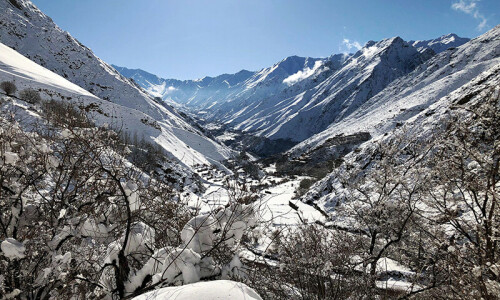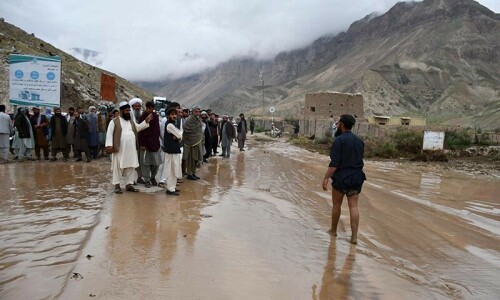More than 300 people were killed in flash floods that ripped through multiple Afghan provinces, the UN’s World Food Programme (WFP) said on Saturday, as authorities declared a state of emergency and rushed to rescue the injured.
Heavy rains on Friday sent roaring rivers of water and mud crashing through villages and across agricultural land in several provinces.
Survivors on Saturday picked through muddy, debris-littered streets and damaged buildings, an AFP journalist saw, as authorities and non-governmental groups deployed rescue workers and aid, warning that some areas had been cut off by the flooding.
Northern Baghlan province was one of the hardest hit, with more than 300 people killed there alone, and thousands of houses destroyed or damaged, according to WFP.
“On current information: in Baghlan province there are 311 fatalities, 2,011 houses destroyed and 2,800 houses damaged,” Rana Deraz, a communications officer for the United Nations agency in Afghanistan, told AFP.
There were disparities between the death tolls provided by the government and humanitarian agencies.
The UN’s International Organisation for Migration said there were 218 deaths in Baghlan.
Abdul Mateen Qani, spokesman for the interior ministry, told AFP that 131 people had been killed in Baghlan, but that the government toll could rise.
“Many people are still missing,” he said.
Another 20 people were reported dead in northern Takhar province and two in neighbouring Badakhshan, he added.
Taliban government spokesman Zabihullah Mujahid said, “Hundreds of our fellow citizens have succumbed to these calamitous floods,” in a statement posted to social media site X earlier today.
“Moreover, the deluge has wrought extensive devastation upon residential properties, resulting in significant financial losses,” he added.
The Foreign Office (FO) extended its condolence on behalf of the government and the nation.
“Our thoughts and prayers are with the families of the victims, injured and the communities affected by this natural calamity and we pray for the early recovery of those missing.
“Pakistan stands in solidarity with the people of Afghanistan during this difficult time,” the FO said.
Rains on Friday caused heavy damage in Baghlan, Takhar and Badakhshan, as well as western Ghor and Herat provinces, officials said, in a country wracked by poverty and heavily dependent on agriculture.
“My house and my whole life was swept away by the flood,” said Jan Mohammad Din Mohammad, a resident of Baghlan provincial capital Pul-i-Khumri.
His family had managed to flee to higher ground but when the weather cleared and they returned home, “there was nothing left, all my belongings and my house had been destroyed”, he said.
“I don’t know where to take my family … I don’t know what to do.”
State of emergency
Emergency personnel were rushing to rescue injured and stranded people, according to the defence ministry.
The ministry ordered multiple branches of the military “to provide any kind of assistance to the victims of this incident with all available resources”.
The air force said it had started evacuation operations as the weather cleared, adding that more than 100 injured people had been transferred to hospital, without specifying from which provinces.
“By announcing the state of emergency in [affected] areas, the Ministry of National Defence has started distributing food, medicine and first aid to the impacted people,” it said.
An AFP journalist saw a vehicle laden with food and water in Baghlan’s Baghlan-i-Markazi district, as well as others carrying the dead to be buried.
Since mid-April, flash flooding and other floods had left about 100 people dead in 10 of Afghanistan’s provinces, with no region entirely spared, according to authorities.
Farmland has been swamped in a country where 80 per cent of the more than 40 million people depend on agriculture to survive.
Afghanistan — which had a relatively dry winter, making it more difficult for the soil to absorb rainfall — is highly vulnerable to climate change.
The nation, ravaged by four decades of war, is one of the poorest in the world and, according to scientists, one of the worst prepared to face the consequences of global warming.
The UN special rapporteur for human rights in Afghanistan, Richard Bennett, said on X the floods were “a stark reminder of Afghanistan’s vulnerability to the climate crisis”.
“Both immediate aid and long-term planning by the Taliban and international actors are needed.”
Mohammed Khater, deputy head of the UN’s humanitarian affairs office in Afghanistan, said the high toll was due in part to people living near waterways, and that deaths were common during the seasonal rains.
“This is an everyday incident during this season, the rainy season,” Khater told AFP.


















































Dear visitor, the comments section is undergoing an overhaul and will return soon.